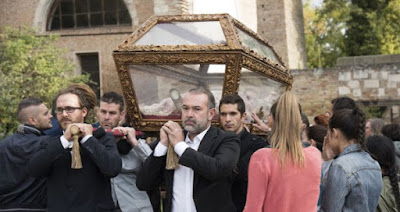Signore Zarmandili and his writers set up their tale quietly and firmly, allowing, within the framework of a 90-minute screen comedy, as much character development as plot development, all of which makes for more depth, as well as enjoyment.
In the leading role of the woman who organizes the workers is the excellent Sicilian-born actress Donatella Finocchiaro (above, from Secret Journey, Sorelle Mai and Terraferma). As usual Ms Finocchiaro brings a lovely, appealing combination of intelligence and easy-going sex appeal to the role.
The "leader" of those nuns -- played with proper reticence and discretion by Maria Roveran (above) -- turns out to be one of the youngest and least tutored (but also the most aware and willing), and the movie's combination of religion and labor proves pretty irresistible because it takes seriously the Italian need for religious faith without ever succumbing to any insistence on belief in miracles and the like.
In fact, the single "miracle" that helps bring things to a proper close is more ironic than anything else, and were Beate not such an endearing and kindly little film, you might also call what happens here deeply cynical. (The Capitalists can now make even more money off religion than they might have from their real estate project!).
The movie's attitude toward sexuality is properly adult, as well. Humanity's foibles, particularly those of the male of the species, are not going to change anytime soon, so let's accept them/enjoy them (or not) -- and move on.
And, sure, labor can work with the Church (wouldn't that be nice?!), and women with men, and retailers with wholesalers, and everyone can profit -- well, somewhat. Cooperation outdoes competition, employing locals is better than outsourcing, and acceptance beats being judgmental -- at least for the length of time you're viewing this little charmer.
Another "find" from Corinth Films, in Italian with English subtitles, and running 90 minutes, the movie opened in virtual cinemas this past weekend. Click here for more information and to view the several locations from which you can choose.























































